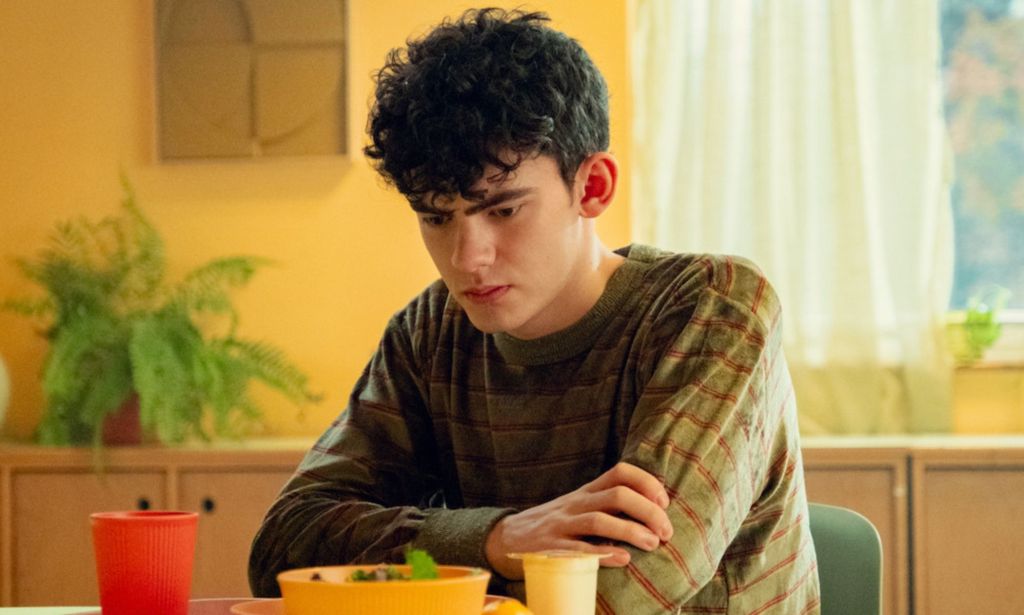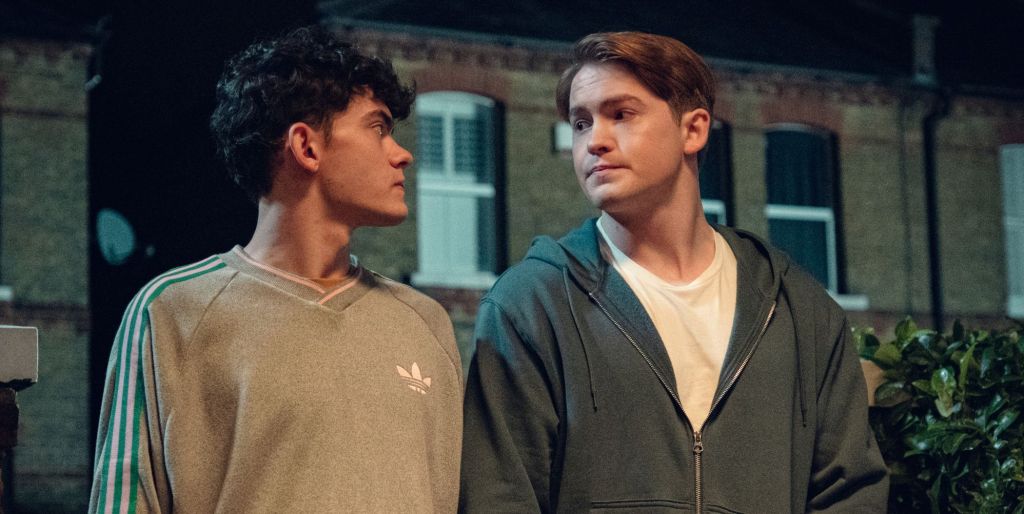Heartstopper’s eating disorder storyline is groundbreaking TV: ‘Not only young girls affected’

Charlie Spring (right) deals with anorexia in Heartstopper season three. (Netflix)
The UK’s leading eating-disorder charity has praised Heartstopper‘s “important and valuable” storyline for raising awareness of how anorexia can affect young LGBTQ+ men.
(Warning: spoilers for Heartstopper season three follow).
At the heart of the third season of Alice Oseman’s queer teen series is lead character Charlie’s experience of living with anorexia, while his boyfriend Nick tries to find him help.
As the new season drops on Netflix, Ella Canham, from Beat – the charity that worked with Heartstopper to ensure the story was authentic – has spoken to PinkNews about how vital the storyline is for correcting misconceptions around eating disorders, and raising awareness of the best ways to support loved ones affected.
Very subtle hints of Charlie’s struggle, portrayed by Joe Locke, were evident in season two, when he gave away his bar of chocolate to Nick (Kit Connor). But now his symptoms are getting worse.
From episode one, Charlie avoids eating with his friends, chooses not to go into the sea for fear of being shirtless, and tells his family that he’ll eat dinner later.
“It’s important to note that eating disorders can look really different from person to person,” explains Canham. “Even if two people are experiencing the same disorder, it can look really different.”
Charlie’s symptoms are common in people with anorexia, which, she says, “involves the restriction or intake [of food], preoccupation with body image, food and weight”.
Other indicators can include someone saying they’ve eaten when they haven’t and pretending they’ve eaten more than they have. There can also be physical symptoms, such as tiredness, weight loss and stomach pain. With other eating disorders, particularly bulimia, symptoms can include “purging behaviours such as laxative use, vomiting after meals or over-exercise”.
LGBTQ+ youngsters are considered to be at a greater risk of developing an eating disorder than their straight, cisgender peers. According to charity The Trevor Project, approximately one in every 10 LGBTQ+ people aged between 13 and 24 has been diagnosed with a disorder, while 29 per cent believe they are living with one undiagnosed.
“We don’t know any of the exact causes for people developing eating disorders,” says Canham. “But what we [do] know is that people from [the] LGBTQ+ community can often experience low self-esteem, anxiety around identity [and] body dissatisfaction, and all those factors can worsen an existing eating disorder, or can lead to the development of a new eating disorder.”

Despite all that, there is a huge under-representation on screen of boys and men with eating disorders – particularly if they are LGBTQ+.
“There’s a really big misconception that eating disorders only affect young girls, and that can often prevent people from reaching out for support,” Canham continues. “We know that early intervention is really important. When that support is put off, that can worsen an existing problem.”
With its sensitive and accurate portrayal of how anorexia can manifest in a young queer man, Heartstopper is ground-breaking TV. Considering that a huge chunk of its millions of viewers are also young, queer men, it’s impossible to overstate the importance of Charlie’s story.
“Awareness is so important and so valuable,” Canham says. “By showing that it’s not just a young girl [who] could be affected, it’s many different people, we really hope that it’ll encourage people to reach out for support, to be aware that they could be affected by an eating disorder, or for loved ones to be aware that somebody they know might be affected.”
There are several moments that accurately portray the reality of living with anorexia in the new season of the show. It takes Charlie a little longer than in Oseman’s graphic novels to open up to Nick and his family. When he does, it results in episode four’s moving exploration of how life-changing seeking support can be – and possibly the best thing Heartstopper has ever done.

Canham says Netflix’s portrayal, with Charlie taking a while to feel comfortable enough to tell his loved ones, is accurate. “It takes a lot of courage, a lot bravery,” she says, and often someone might feel they have it under control or that they don’t need support. “Then it can start to feel more out of control. That’s when it feels most scary to reach out for support.”
Also ringing true is the fact that Charlie’s recovery isn’t linear.
Canham wants people in recovery, who are struggling, to know that it’s common. “Eating disorders are complex mental illnesses and it does take time… there might be times [where] days feel much harder and [where] days feel much better. That doesn’t mean that you’re not in recovery. It doesn’t mean you’re not working really hard, it just means that sometimes you need a little bit more support than [at] others. That’s completely normal.”
While Charlie is at the centre of the story, his loved ones, particularly Nick, have a key role to play. It’s one many people find themselves in: learning how to approach, and support, someone they believe has an eating disorder.
Canham points out that Nick does so many things right: he starts with extensive research, and when he decides to approach Charlie, he does so not at meal times, but in a calm, private space.

For viewers concerned about someone they love, Canham suggests a similar approach. “Try asking: ‘Would you like to talk about how things have been?’ rather than direct statements such as, ‘You need to get help’,” she urges, “because that can push somebody into a corner and they might not want to open up”.
At first, Charlie insists that he’s fine, but Nick continues to “hold space” for his boyfriend to speak when he’s ready, checking in, and being “non-judgmental and empathetic”. These simple things can make a huge difference, although Canham acknowledges how “scary, challenging and isolating” supporting someone with an eating disorder can be.
“It’s really important that your mental health is looked after as well, so that you’re not pouring from an empty cup,” she says.
Beat’s helpline is available to those supporting someone with an eating disorder, not just the person in question. The charity’s website has a platform specifically for those supporting a loved one.
Most importantly, Beat’s message is clear, and Heartstopper is hammering it home. “It’s really great that this platform is showing that support is available,” Canham says. “Recovery from an eating disorder is always possible.”
If you’re worried about your own or someone else’s health, you can contact Beat during the week between 3pm and 8pm on 0808 801 0677 in England, 0808 801 0432 in Scotland, 0808 801 0433 in Wales, and 0808 801 0434 in Northern Ireland, or at beateatingdisorders.org.uk
For readers in the US, the National Eating Disorders Association has collated a directory of national and regional support providers.
Heartstopper season three is streaming on Netflix now.
Share your thoughts! Let us know in the comments below, and remember to keep the conversation respectful.
How did this story make you feel?

